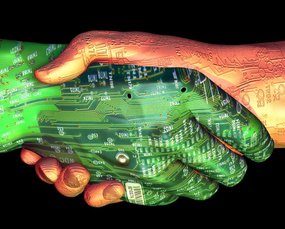 NEWS
NEWS
 NEWS
NEWS
 NEWS
NEWS
![]() When we think about files and storage, we always imagine devices like USB keys, external hard drives, the cloud, SD cards, mobile devices and so on. The problem with these types of storage devices is that one could easily lose an SD card or USB key, we have to carry these things around, and you can’t access your data in the cloud if you don’t have an internet connection. Aside from that, these devices can all easily be hacked or stolen. So if you have sensitive files stored in them, well, you’re screwed.
When we think about files and storage, we always imagine devices like USB keys, external hard drives, the cloud, SD cards, mobile devices and so on. The problem with these types of storage devices is that one could easily lose an SD card or USB key, we have to carry these things around, and you can’t access your data in the cloud if you don’t have an internet connection. Aside from that, these devices can all easily be hacked or stolen. So if you have sensitive files stored in them, well, you’re screwed.
So how can we overcome these kinds of obstacles, and ensure that all of our data is easily carried, never lost and never ever hacked? Simple, we implant an RFID directly into our bodies :)
Anthony Antonellis has done just that. The artists recently implanted an RFID chip under the skin of his left hand that is capable of storing between 1KB and 2KB of data. The data can stored and accessed wirelessly using a smartphone. Though 1-2KB of data is really small, the whole point of the exercise is that body storage implants are totally feasible and can be done with existing technology.
The concept isn’t as awesome as you think though, since the RFID chip is encased in glass, has a short antenna on top of being implanted under the skin, it only has a range of about two centimeters. So if you want to get or transfer files, you need to be holding your phone on top of where the implant is. Still, the point is, it can be done, and with a lot more tinkering done by the experts, the range can be amplified and the storage can be multiplied.
Antonellis sees the RFID implant as a net.art tattoo. At the moment, you can store GIFs in it so that when you tap your phone near implant, you could see the GIF file automatically play. It also helps with the fact that you never have to worry about losing your files, unless of course you lose your limb.
The use case of this type of storage seems limited at the moment, but thinking about the future, if you want your important files to be inaccessible to anyone but you, then placing them under the skin is the perfect place to hide them. But just remember that if you do opt for implantable memory, be sure not to brag about it too much as you might wake up one way with a hole on your arm :)
This isn’t the first time someone tried to fuse technology with the human body. People have been equipped with hi-tech limbs for years, and just last month Rich Lee implanted magnetic earphones into his ears. Lee grew tired of the cumbersome traditional earphones and headphones and decided he wanted to hear music and podcasts right inside his ear, like it’s playing right inside his mind. Aside from that, Lee plans to connect his phone’s GPS to the magnetic earphones so it would be like having someone speaking directions inside his head. It sounds crazy but then again, it’s not beyond the realms of impossibility that this technology could be used by spies or people with impaired hearing in the future.
It’s not as easy as sticking magnets in your ears though. Magnets are implanted in your ears, then you need a magnetic coil around your neck that connects to your phone via a 3.5mm jack, which sends the vibrations to the magnets in your ears. Lee also had a magnet implanted into his finger so when he puts his finger to his ear, he hears music from it.
This extreme tech probably seems a bit weird and far-fetched at the moment but hey, if you have no aversion to minor surgery, magnets and you don’t mind hearing voices in your head, then maybe you can try it out and pretend you’re an alien, a spy or have bionic capabilities.
Support our mission to keep content open and free by engaging with theCUBE community. Join theCUBE’s Alumni Trust Network, where technology leaders connect, share intelligence and create opportunities.
Founded by tech visionaries John Furrier and Dave Vellante, SiliconANGLE Media has built a dynamic ecosystem of industry-leading digital media brands that reach 15+ million elite tech professionals. Our new proprietary theCUBE AI Video Cloud is breaking ground in audience interaction, leveraging theCUBEai.com neural network to help technology companies make data-driven decisions and stay at the forefront of industry conversations.